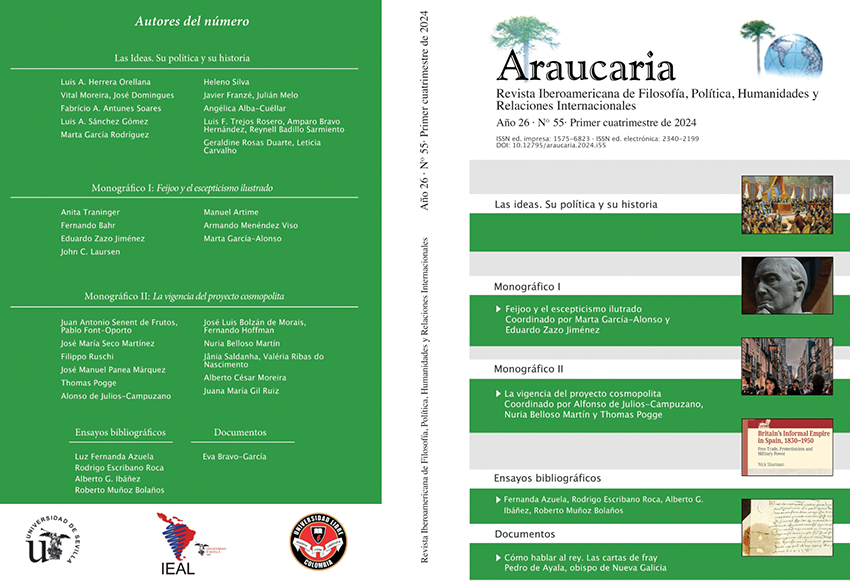Un mundo moralizado: seguridad jurídica con normas justas
Global domestic politics: a moralized world
DOI :
https://doi.org/10.12795/araucaria.2024.i55.23Mots-clés :
derechos humanos, necesidades básicas, imparcialidad, desigualdad, John Rawls, modus vivendi, nacionalismo, paz, poder, Estado de derecho, Thomas Hobbes, justicia, nepotismoRésumé
Las sociedades más avanzadas de la actualidad se estructuran en torno a tres elementos normativos: el Estado de derecho, la satisfacción de las necesidades humanas básicas y la limitación de las desigualdades. Son elementos profundamente arraigados en la cultura, y se espera que los ciudadanos subordinen sus intereses y valores a un compromiso con el funcionamiento social justo y equitativo. Podría decirse que la supervivencia a largo plazo de la humanidad requiere un logro civilizatorio análogo en el plano global. Allí también, las normas y los acuerdos institucionales justos y equitativos pueden persistir solo si se espera que quienes se encargan de su diseño y funcionamiento sean estrictamente imparciales en la ejecución de sus funciones públicas y, por tanto, ampliamente denunciados por cualquier favoritismo hacia su país de origen. Como un mero reflejo de modus vivendi, el estado actual de las relaciones internacionales implica la expectativa contraria: que los agentes que operan a nivel supranacional actúen para promover los intereses y valores concretos de su Estado de origen. Este nepotismo nacional impide el surgimiento de un orden mundial basado en valores compartidos que la humanidad necesita urgentemente.
Téléchargements
Références
Blake, Michael. “Distributive Justice, State Coercion, and Autonomy”, Philosophy and Public Affairs 30 (2001): 257-96.
Cohen, Joshua y Sabel, Charles. “Extram Republicam Nulla Justitia?”, Philosophy and Public Affairs 34 (2006), pp. 147-75.
Dworkin, Ronald. Law’s Empire,Cambridge MA, Harvard University Press, 1986.
Dworkin, Ronald. Sovereign Virtue: The Theory and Practice of Equality, Cambridge MA, Harvard University Press, 2002.
Kant, Immanuel. Metaphysik der Sitten, Rechtslehre, Preußische Akademieausgabe, Vol. VI, 1977.
Lessig, Larry. Republic, Lost: How Money Corrupts Congress - and a Plan to Stop It, Nueva York, Hachette Book Group, 2011.
Nagel, Thomas. The Possibility of Altruism, Princeton, Princeton University Press, 1970.
Nagel, Thomas. “The Problem of Global Justice”, Philosophy and Public Affairs 33 (2005), 113-47.
Nye, Joseph. Soft Power: The Means to Success in World Politics, Nueva York, Public Affairs, 2004.
Parfit, Derek. Reasons and Persons, Oxford, Oxford University Press 1984.
Pogge, Thomas. World Poverty and Human Rights: Cosmopolitan Responsibility and Reform, Cambridge, Polity Press, 2002.
Pogge, Thomas. “Historical Wrongs: The Two Other Domains” en Lukas Meyer (ed.): Justice in Time. Responding to Historical Injustice, Baden-Baden, NOMOS Verlag, 2004, 117-134.
Pogge, Thomas. La pobreza en el mundo y los derechos humanos, trad. Ernest Weikert García, Barcelona, Paidós, 2005.
Pogge, Thomas. Politics as Usual: What Lies behind the Pro-Poor Rhetoric, Cambridge, Polity Press, 2010.
Rawls, John. A Theory of Justice, Cambridge, MA, Harvard University Press, 1971.
Rawls, John. “The Basic Liberties and their Priority” en John Rawls, Political Liberalism, New York, Columbia University Press 1993, lección VIII.
Raz, Joseph. Practical Reason and Norms, Princeton, Princeton University Press, 1990.
Ridge, Michael. “Reasons for Action: Agent-Neutral vs. Agent-Relative,” en Stanford Encyclopedia of Philosophy, 2022. http://plato.stanford.edu/entries/reasons-agent/ (último acceso 03/14/2023)
Sidgwick, Henry. The Methods of Ethics, 7a ed., Indianápolis, Indiana, Hackett, 1981.
Tucídides, The Peloponnesian War, trad. Crawley Richard, London, New York, E. P. Dutton, 1910.
Téléchargements
Publié-e
Comment citer
Numéro
Rubrique
Licence
Las ediciones impresa y electrónica de esta Revista son editadas por el Secretariado de Publicaciones de la Universidad de Sevilla, siendo necesario citar la procedencia en cualquier reproducción parcial o total.Salvo indicación contraria, todos los contenidos de la edición electrónica se distribuyen bajo una licencia de uso y distribución “Creative Commons Atribución-NoComercial-SinDerivar 4.0 Internacional”








